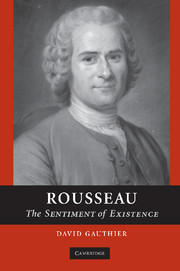3 - Politics of Redemption
Published online by Cambridge University Press: 29 March 2010
Summary
“At the moment of that reading I saw another universe and I became another man.” (CW5.294, OC1.351) In these words Rousseau announced his transformation under the tree on the way to Vincennes. We have examined some of the fruits of that transformation – the legends of the Fall recounted in the Discourse on the Origin of Inequality, the attempt to make a free man in Emile. But we have not asked, who is this other man whom Rousseau became as he read the question of the Academy of Dijon, “Has the restoration of the Sciences and Arts tended to purify or corrupt Morals?”
Rousseau's illumination took place in the summer of 1749. The following January he wrote to Voltaire, signing himself “J. J. Rousseau, citoyen de Genève.” It was his first declaration of his new identity. He published his prize-winning answer to the Academy's question, the Discourse on the Sciences and Arts, not under his own name but “Par un Citoyen de Genève.” He came to be familiarly called and identified as “the Citizen,” and several of his subsequent writings were identified as by “J. J. [or, alternatively, Jean Jacques] Rousseau, citoyen de Genève.” Citizen of Geneva – this is the identity Rousseau assumes under the tree on the way to Vincennes. It is the Citizen who speaks in the writings we have examined in previous chapters, and who should reveal himself directly as we consider Rousseau's ideal of citizenship – his ideal of what he claims to be.
- Type
- Chapter
- Information
- RousseauThe Sentiment of Existence, pp. 52 - 78Publisher: Cambridge University PressPrint publication year: 2006



